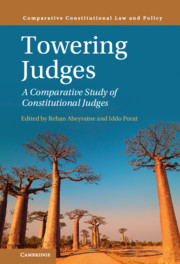Book contents
- Towering Judges
- Comparative Constitutional Law and Policy
- Towering Judges
- Copyright page
- Dedication
- Contents
- Acknowledgements
- Contributors
- Introduction: Towering Judges – A Conceptual and Comparative Analysis
- 1 Towering Judges and Global Constitutionalism
- 2 The Landscapes that Towering Judges Tower Over
- 3 Sir Anthony Mason: Towering Over the High Court of Australia
- 4 Lady Hale: A Feminist Towering Judge
- 5 Hugh Kennedy: Ireland’s (Quietly) Towering Nation-Maker
- 6 Judicial Rhetoric of a Liberal Polity: Hong Kong, 1997–2012
- 7 Judicial Minimalism as Towering: Singapore’s Chief Justice Chan Sek Keong
- 8 Nepal’s Most Towering Judge: The Honourable Kalyan Shrestha
- 9 Barak’s Legal Revolutions and What Remains of Them: Authoritarian Abuse of the Judiciary-Empowerment Revolution in Israel
- 10 PN Bhagwati and the Transformation of India’s Judiciary
- 11 Justice Cepeda’s Institution-Building on the Colombian Constitutional Court: A Fusion of the Political and the Legal
- 12 A Towering but Modest Judicial Figure: The Case of Arthur Chaskalson
- 13 Chief Justice Sólyom and the Paradox of “Revolution under the Rule of Law”
- 14 The Socialist Model of Individual Judicial Powers
- 15 The Civil Law Tradition, the Pinochet Constitution, and Judge Eugenio Valenzuela
- 16 Towering versus Collegial Judges: A Comparative Reflection
- Appendix
- Index
16 - Towering versus Collegial Judges: A Comparative Reflection
Published online by Cambridge University Press: 25 March 2021
- Towering Judges
- Comparative Constitutional Law and Policy
- Towering Judges
- Copyright page
- Dedication
- Contents
- Acknowledgements
- Contributors
- Introduction: Towering Judges – A Conceptual and Comparative Analysis
- 1 Towering Judges and Global Constitutionalism
- 2 The Landscapes that Towering Judges Tower Over
- 3 Sir Anthony Mason: Towering Over the High Court of Australia
- 4 Lady Hale: A Feminist Towering Judge
- 5 Hugh Kennedy: Ireland’s (Quietly) Towering Nation-Maker
- 6 Judicial Rhetoric of a Liberal Polity: Hong Kong, 1997–2012
- 7 Judicial Minimalism as Towering: Singapore’s Chief Justice Chan Sek Keong
- 8 Nepal’s Most Towering Judge: The Honourable Kalyan Shrestha
- 9 Barak’s Legal Revolutions and What Remains of Them: Authoritarian Abuse of the Judiciary-Empowerment Revolution in Israel
- 10 PN Bhagwati and the Transformation of India’s Judiciary
- 11 Justice Cepeda’s Institution-Building on the Colombian Constitutional Court: A Fusion of the Political and the Legal
- 12 A Towering but Modest Judicial Figure: The Case of Arthur Chaskalson
- 13 Chief Justice Sólyom and the Paradox of “Revolution under the Rule of Law”
- 14 The Socialist Model of Individual Judicial Powers
- 15 The Civil Law Tradition, the Pinochet Constitution, and Judge Eugenio Valenzuela
- 16 Towering versus Collegial Judges: A Comparative Reflection
- Appendix
- Index
Summary
This chapter offers a concluding reflection on the idea of a towering judge, its value, complexity and potential dangers. Drawing on prior chapters and contributions, it suggests that the idea of a towering judge could be understood in more or less objective/subjective, national/international and relative/absolute terms, as well as across different time frames. It notes the value in asking these questions, as well as in studying the jurisprudence of leading judges cross-nationally. At the same time, it suggests several potential dangers associated with a focus on ‘towering judges’. The idea of a towering judge may tend to privilege chief justices over other leading judges, and male over female justices. And it may not always be a good thing for the courts on which a judge serves. The chapter therefore concludes the volume with a note of caution: even while acknowledging the value of studying leading judges, we might ultimately do better to celebrate more collegial, non-dominant forms of judicial leadership.
Keywords
- Type
- Chapter
- Information
- Towering JudgesA Comparative Study of Constitutional Judges, pp. 308 - 329Publisher: Cambridge University PressPrint publication year: 2021



